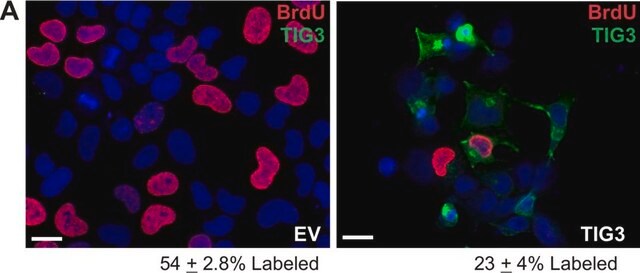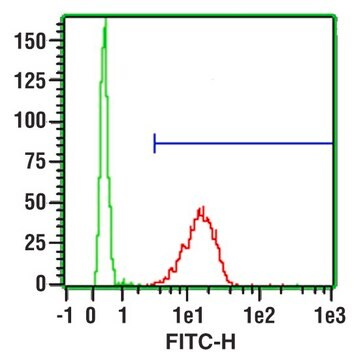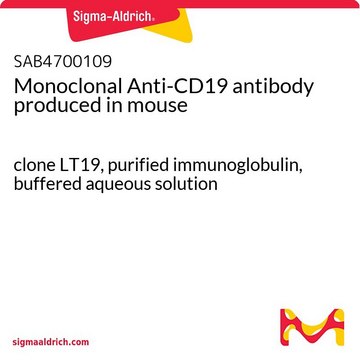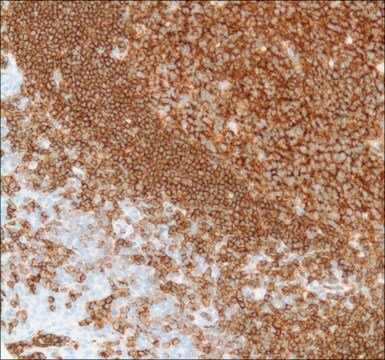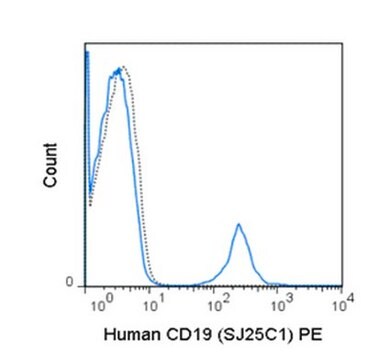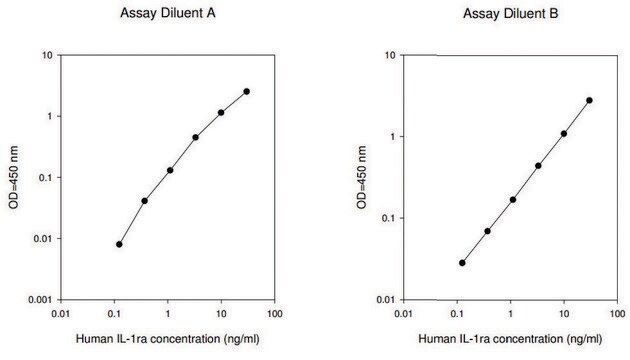SAB4700112
Monoclonal Anti-CD19-FITC antibody produced in mouse
clone LT19, purified immunoglobulin, buffered aqueous solution
Sign Into View Organizational & Contract Pricing
All Photos(1)
About This Item
UNSPSC Code:
12352203
NACRES:
NA.44
conjugate:
FITC conjugate
application:
FACS
clone:
LT19, monoclonal
species reactivity:
human
citations:
4
technique(s):
flow cytometry: suitable
Recommended Products
biological source
mouse
Quality Level
conjugate
FITC conjugate
antibody form
purified immunoglobulin
antibody product type
primary antibodies
clone
LT19, monoclonal
form
buffered aqueous solution
species reactivity
human
technique(s)
flow cytometry: suitable
isotype
IgG1
NCBI accession no.
UniProt accession no.
shipped in
wet ice
storage temp.
2-8°C
target post-translational modification
unmodified
Gene Information
human ... CD19(930)
General description
The antibody LT19 reacts with CD19 (B4), a 95 kDa type I transmembrane glycoprotein (immunoglobulin superfamily) expressed on B lymphocytes and follicular dendritic cells; it is lost on plasma cells.
Immunogen
Daudi human Burkitt lymphoma cell line
Application
The reagent is designed for Flow Cytometry analysis of human blood cells using 20 μL reagent / 100 μL of whole blood or 1e6 cells in a suspension. The content of a vial (2 mL) is sufficient for 100 tests.
Features and Benefits
Evaluate our antibodies with complete peace of mind. If the antibody does not perform in your application, we will issue a full credit or replacement antibody. Learn more.
Physical form
Solution in phosphate buffered saline containing 15 mM sodium azide and 0.2% high-grade protease free BSA as a stabilizing agent.
Disclaimer
Unless otherwise stated in our catalog or other company documentation accompanying the product(s), our products are intended for research use only and are not to be used for any other purpose, which includes but is not limited to, unauthorized commercial uses, in vitro diagnostic uses, ex vivo or in vivo therapeutic uses or any type of consumption or application to humans or animals.
Not finding the right product?
Try our Product Selector Tool.
Storage Class Code
10 - Combustible liquids
WGK
WGK 2
Flash Point(F)
Not applicable
Flash Point(C)
Not applicable
Choose from one of the most recent versions:
Already Own This Product?
Find documentation for the products that you have recently purchased in the Document Library.
Carrie E Gifford et al.
Cytometry. Part B, Clinical cytometry, 86(4), 263-271 (2014-03-13)
X-linked lymphoproliferative disease is caused by mutations in two genes, SH2D1A and XIAP/BIRC4. Flow cytometric methods have been developed to detect the gene products, SAP and XIAP. However, there is no literature describing the accuracy of flow cytometric screening performed
I Pizzitola et al.
Leukemia, 28(8), 1596-1605 (2014-02-08)
As significant numbers of acute myeloid leukemia (AML) patients are still refractory to conventional therapies or experience relapse, immunotherapy using T cells expressing chimeric antigen receptors (CARs) might represent a valid treatment option. AML cells frequently overexpress the myeloid antigens
Chung-Wu Lin et al.
Blood, 106(10), 3567-3574 (2005-07-28)
Most lymphoblastic lymphomas (LBLs) are regarded as neoplasms of immature T cells because they express cytoplasmic CD3 and frequently carry T-cell receptor (TCR) gene rearrangements. Immature natural killer (NK) and T cells, however, have a common bipotent T/NK-cell precursor in
J Pieper et al.
Scandinavian journal of immunology, 79(2), 149-155 (2013-12-10)
Proinflammatory CD4(+) CD28(null) T cells are frequently found in the circulation of patients with rheumatoid arthritis (RA), but are less common in the rheumatic joint. In the present study, we sought to identify functional differences between CD4(+) CD28(null) T cells
Our team of scientists has experience in all areas of research including Life Science, Material Science, Chemical Synthesis, Chromatography, Analytical and many others.
Contact Technical Service